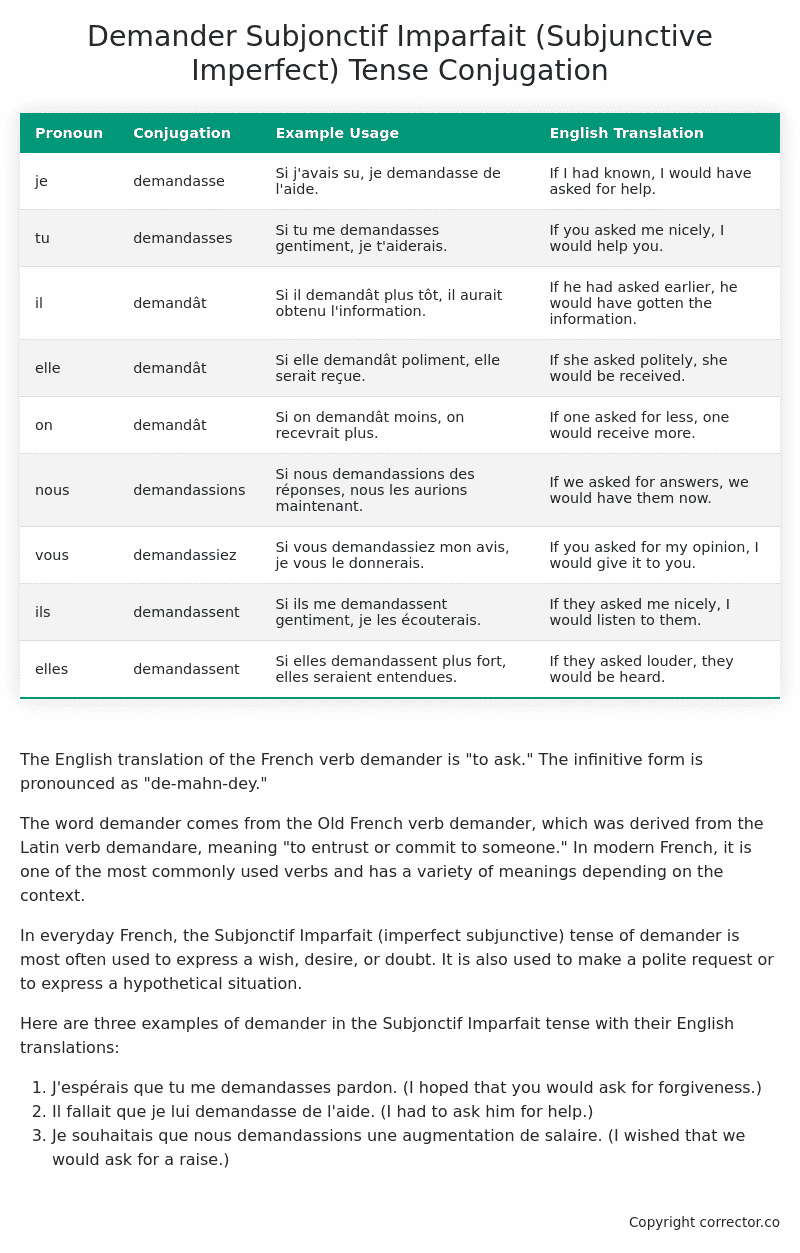Subjonctif Imparfait (Subjunctive Imperfect) Tense Conjugation of the French Verb demander
Introduction to the verb demander
The English translation of the French verb demander is “to ask.” The infinitive form is pronounced as “de-mahn-dey.”
The word demander comes from the Old French verb demander, which was derived from the Latin verb demandare, meaning “to entrust or commit to someone.” In modern French, it is one of the most commonly used verbs and has a variety of meanings depending on the context.
In everyday French, the Subjonctif Imparfait (imperfect subjunctive) tense of demander is most often used to express a wish, desire, or doubt. It is also used to make a polite request or to express a hypothetical situation.
Here are three examples of demander in the Subjonctif Imparfait tense with their English translations:
- J’espérais que tu me demandasses pardon. (I hoped that you would ask for forgiveness.)
- Il fallait que je lui demandasse de l’aide. (I had to ask him for help.)
- Je souhaitais que nous demandassions une augmentation de salaire. (I wished that we would ask for a raise.)
Table of the Subjonctif Imparfait (Subjunctive Imperfect) Tense Conjugation of demander
| Pronoun | Conjugation | Example Usage | English Translation |
|---|---|---|---|
| je | demandasse | Si j’avais su, je demandasse de l’aide. | If I had known, I would have asked for help. |
| tu | demandasses | Si tu me demandasses gentiment, je t’aiderais. | If you asked me nicely, I would help you. |
| il | demandât | Si il demandât plus tôt, il aurait obtenu l’information. | If he had asked earlier, he would have gotten the information. |
| elle | demandât | Si elle demandât poliment, elle serait reçue. | If she asked politely, she would be received. |
| on | demandât | Si on demandât moins, on recevrait plus. | If one asked for less, one would receive more. |
| nous | demandassions | Si nous demandassions des réponses, nous les aurions maintenant. | If we asked for answers, we would have them now. |
| vous | demandassiez | Si vous demandassiez mon avis, je vous le donnerais. | If you asked for my opinion, I would give it to you. |
| ils | demandassent | Si ils me demandassent gentiment, je les écouterais. | If they asked me nicely, I would listen to them. |
| elles | demandassent | Si elles demandassent plus fort, elles seraient entendues. | If they asked louder, they would be heard. |
Other Conjugations for Demander.
Le Present (Present Tense) Conjugation of the French Verb demander
Imparfait (Imperfect) Tense Conjugation of the French Verb demander
Passé Simple (Simple Past) Tense Conjugation of the French Verb demander
Passé Composé (Present Perfect) Tense Conjugation of the French Verb demander
Futur Simple (Simple Future) Tense Conjugation of the French Verb demander
Futur Proche (Near Future) Tense Conjugation of the French Verb demander
Plus-que-parfait (Pluperfect) Tense Conjugation of the French Verb demander
Passé Antérieur (Past Anterior) Tense Conjugation of the French Verb demander
Futur Antérieur (Future Anterior) Tense Conjugation of the French Verb demander
Subjonctif Présent (Subjunctive Present) Tense Conjugation of the French Verb demander
Subjonctif Passé (Subjunctive Past) Tense Conjugation of the French Verb demander
Subjonctif Imparfait (Subjunctive Imperfect) Tense Conjugation of the French Verb demander (this article)
Subjonctif Plus-que-parfait (Subjunctive Pluperfect) Tense Conjugation of the French Verb demander
Conditionnel Présent (Conditional Present) Tense Conjugation of the French Verb demander
Conditionnel Passé (Conditional Past) Tense Conjugation of the French Verb demander
L’impératif Présent (Imperative Present) Tense Conjugation of the French Verb demander
L’infinitif Présent (Infinitive Present) Tense Conjugation of the French Verb demander
Struggling with French verbs or the language in general? Why not use our free French Grammar Checker – no registration required!
Get a FREE Download Study Sheet of this Conjugation 🔥
Simply right click the image below, click “save image” and get your free reference for the demander Subjonctif Imparfait tense conjugation!

Demander – About the French Subjonctif Imparfait (Subjunctive Imperfect) Tense
Formation
Common Everyday Usage Patterns
Interactions with Other Tenses
Subjonctif Présent
Indicatif Passé Composé
Conditional
Conditional Perfect
Summary
I hope you enjoyed this article on the verb demander. Still in a learning mood? Check out another TOTALLY random French verb conjugation!


